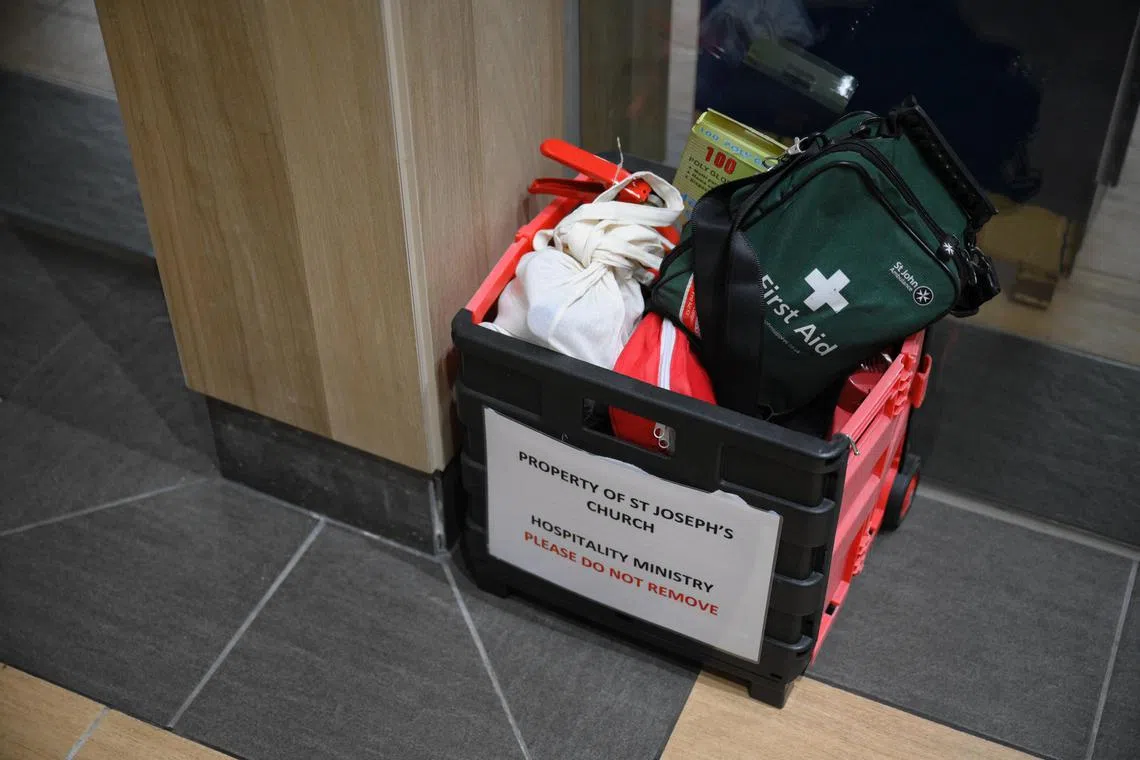St Joseph’s Church bolstering physical, psychological safety measures after attack on priest
Sign up now: Get ST's newsletters delivered to your inbox
![CMG20241201-LimMS01/林明顺/郑智浩/晚班意外跟进武吉知马圣若瑟堂 36岁杂工持刀
被揭发 [St Joseph's Church, 620
Upper Bukit Timah Road]](https://cassette.sphdigital.com.sg/image/straitstimes/6a46710806cdb1b9a38fa496278328efaf4856664a2b2a9871f9ee4914c9a980)
The church said it is strengthening its security and safety measures, in preparation for the busy Christmas and New Year periods.
PHOTO: LIANHE ZAOBAO
SINGAPORE - St Joseph’s Church (Bukit Timah) is beefing up its emergency preparedness and psychological first aid (PFA) capabilities after a priest was attacked during mass
The church’s pastoral teams coordinator, Ms Jane Lau, told The Straits Times that the parish emergency preparedness task force is looking to “strengthen its practices and expand its team” to ensure parishioners’ safety.
The task force at St Joseph’s, which was set up in 2018, comprises church volunteers who serve as first responders to render help during emergencies.
Since the Nov 9 attack, all churches in the archdiocese have been encouraged to be proactive and step up their security measures, the Roman Catholic Archdiocese of Singapore said.
It added that parishioners were also encouraged to be vigilant.
In its Dec 1 newsletter to parishioners, St Joseph’s said it is strengthening its security and safety measures, especially for the busy Advent, Christmas and New Year periods.
Members of the task force will attend every mass, said the newsletter.
Churchgoers were also encouraged to report any suspicious behaviour or unattended items to volunteers immediately, and were advised against leaving any small or large bags in the lobby.
The church also has 13 volunteer catechists who completed an Advanced Psychological First Aid course in July 2023.

A first aid kit seen at the chapel within St Joseph’s Church on Dec 6.
ST PHOTO: MARK CHEONG
Ms Lau said there are plans to expand this team to provide better psychological support to children and parents.
Catechists are religious education teachers who teach children and teenagers aged between three and 16.
“We are also looking to expand the PFA team beyond those serving young people to the rest of the parish,” said Ms Lau.
The attack on Nov 9 occurred during the monthly children’s mass. Sources who spoke to ST said many children were sitting near the front when it happened, and they started screaming and crying.
What happened immediately after Nov 9
In the immediate aftermath of the incident, the church, with the help of Catholic Family Life (CFL), organised counselling sessions for affected parishioners on Nov 10.
The CFL is a charity and member of the National Council of Social Service, which offers counselling and therapy services.
“The parish office phone number has always been made available to the parishioners, and at least one call was made by an adult to the parish office seeking counselling help,” said Ms Lau.
An e-mail sent from the Office For Catechesis on Nov 12 and seen by ST advised catechists across churches in Singapore to check the well-being of children and teenagers.
The catechists were asked to take note of potential signs of distress, such as increased irritability, anger or aggression, overly sensitive responses to sudden sounds or movements, concentration difficulties and sleep deprivation.
On Nov 13, the church engaged a psychologist to hold a talk, titled Helping Kids And Teens After A Traumatic Event, said Ms Lau.
“We continued to check in on families as well as adults who assisted at the mass in the first and second week after the incident,” she added.
Help offered
Parishioners affected by the incident would be provided with two different levels of service, said Mr Daniel Ng, principal therapist at CFL.
The first level of help would entail psychological first aid where mental health professionals provide a safe space for clients to talk about and process the experience.
“The aim is to help them normalise their reactions and provide a road map of expected recovery based on the idea of human resilience,” said Mr Ng.
The second level would be trauma-related mental health treatment, which is for those who continue to experience escalating or unabated trauma reactions that affect their daily lives.
For those affected by the event but who do not want to seek mental health support, talking about it with a trusted confidant can be cathartic and helpful, said Mr Ng.
Continuing with routines such as regular exercises and classes can also provide a sense of psychological safety that the incident may have disrupted.
“Exercise, in moderation, can help to regulate the nervous system, which helps to reduce stress and anxiety,” Mr Ng said.
“However, the important thing is that it’s different strokes for different folks – and the principle is that the activity should not generally induce further stress and anxiety.”



